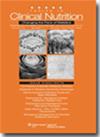Food Fussiness in Children
IF 0.4
4区 医学
Q4 NUTRITION & DIETETICS
引用次数: 1
Abstract
This cross-sectional study aimed to investigate the relationship between children's food fussiness (FF) and dietary diversity, eating behaviors, and parental feeding practices among 314 Cypriot preschoolers aged 3 to 5 years and their parents. Fussy eaters showed negative eating behaviors in general (P < .05). The mean scores of prompting and encouragement to eat were significantly higher among non–fussy eaters (P < .05). Food fussiness scores were negatively correlated with dietary diversity scores (rs = −0.178, P < .05) and positively correlated with parental emotional feeding (rs = 0.114, P < .05). In addition, strictly controlled feeding was positively associated with FF scores (β: .115; 95% confidence interval: 0.041-0.251) and each unit increment in instrumental feeding decreased the risk of FF by 90% (odds ratio: 0.104; 95% confidence interval: 0.037-0.295). Longitudinal studies with larger samples are needed to confirm these correlations through parent-child intervention study designs.儿童对食物的挑剔
这项横断面研究旨在调查314名3至5岁的塞浦路斯学龄前儿童及其父母的儿童食物挑剔(FF)与饮食多样性、饮食行为和父母喂养习惯之间的关系。挑食者总体上表现出消极的饮食行为(P<.05)。在不挑食者中,鼓励和鼓励进食的平均得分显著更高(P<0.05)。食物挑食得分与饮食多样性得分呈负相关(rs=-0.178,P<.05,严格控制喂养与FF评分呈正相关(β:.115;95%置信区间:0.041-0.251),仪器喂养的每增加一个单位,FF的风险降低90%(比值比:0.104;95%可信区间:0.037-0.295)。需要对更大样本进行纵向研究,通过亲子干预研究设计来证实这些相关性。
本文章由计算机程序翻译,如有差异,请以英文原文为准。
求助全文
约1分钟内获得全文
求助全文
来源期刊

Topics in Clinical Nutrition
NUTRITION & DIETETICS-
CiteScore
0.90
自引率
20.00%
发文量
34
期刊介绍:
Topics in Clinical Nutrition (TICN) is a peer-reviewed, quarterly journal designed as a resource for the continuing education and clinical practice of dietitians and nutritionists. Each issue addresses topics of interest primarily to dietitians and nutritionists, students and interns in professional training programs and other health care personnel involved in the nutritional care of patients. Articles include translational research reports (work that applies new knowledge to practical effect), practice projects, evidence-based literature reviews, case studies and book reviews, and articles that highlight education theory and applied research which share the tools and techniques of nutrition and dietetics education.
 求助内容:
求助内容: 应助结果提醒方式:
应助结果提醒方式:


